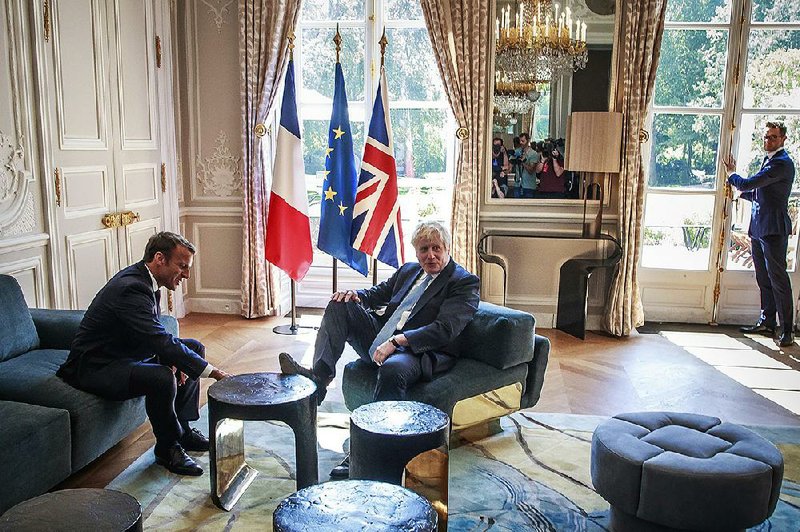French President Emmanuel Macron gave U.K. Prime Minister Boris Johnson little hope he's prepared to compromise on Brexit and said any changes to the current deal won't be very significant.
A day after Johnson held talks with German Chancellor Angela Merkel in Berlin, the British premier discussed with Macron in Paris how to solve the Brexit impasse that threatens to propel the U.K. out of the European Union on Oct. 31 without the protection of a transition period. Merkel suggested it may be possible to find a solution within the next month if Johnson could provide realistic ideas -- leading the U.K. premier to praise her "can-do spirit."
[Video not showing up above? Click here to watch » https://www.youtube.com/watch?v=sqnnf9HrZeg]
But Macron's remarks will have tempered some of the optimism.
"Let me be very clear: We will not find a new withdrawal agreement within 30 days that will be very different from the existing one," Macron said alongside Johnson before their talks. "We have to respect what was negotiated."
The Brexit deal, which took 19 months for Johnson's predecessor, Theresa May, and the 27 other EU governments to agree to, was rejected three times by the British Parliament. Johnson is demanding the EU scrap the so-called backstop, the mechanism designed to keep the Irish border free of checks after Brexit that's a key part of the current agreement.
Even so, investors reacted positively to the fact Macron didn't completely rule out the chances of a breakthrough, pushing the pound to a three-week high.
The French presidency later described the meeting with Johnson as "constructive." Macron reiterated that Brexit negotiations must respect the stability of Ireland and the integrity of the bloc's single market, while both sides want talks to continue through the end of September, it said.
"I want a deal and I think we can get a deal and a good deal," Johnson said before the meeting began.
Johnson's problem is that the EU doesn't believe he has a realistic alternative to the backstop. Once again, the British premier pointed to a series of measures he thinks may help, including the use of technology and trusted-trader systems, but Macron offered no comment on this. The ideas have been rejected as unsatisfactory by the EU many times over the past two years.
The backstop provision is opposed by ardent Brexit supporters in Johnson's Conservative Party because it would keep the U.K. tied to many of the EU's customs and trading rules. While Johnson says he's committed to not bringing back infrastructure to the Irish border, the EU regards the backstop as necessary to protect its single market.
Earlier, Northern Ireland's police chief Simon Byrne told RTE radio that technology won't be enough to manage the border, while a senior EU official told reporters in Brussels a no-deal Brexit is the most likely outcome.
Johnson seized on Merkel's reference to "30 days" as a sign she was willing to give the U.K. leeway and some time to change the Brexit deal. But her remarks suggested that she was skeptical and, in any case, wouldn't replace the backstop as the ultimate guarantee of no hard border.
Merkel said Thursday that she didn't mean the 30 days as a strict deadline, but simply a short time period "because the U.K. have said they want to leave the EU by Oct. 31."
In Paris, Macron also sounded skeptical. He reiterated that any solution would need to do the same job as the backstop, and if there wasn't one, it was a "British political problem" that only Johnson could solve.
"Just like Chancellor Merkel, I'm also very much confident that with joint intelligence we should be able to find something smart within 30 days if there's goodwill on both sides," he said. "We need to try to have a useful month."
Johnson next takes his case to the Group of Seven leader's summit in Biarritz, France, which starts Saturday, where he'll meet Merkel and Macron again. He will hold talks with European Council President Donald Tusk on Sunday.
Information for this article was contributed by Geraldine Amiel, James Regan, Jessica Shankleman, Robert Hutton and Ania Nussbaum of Bloomberg News.
A Section on 08/23/2019

